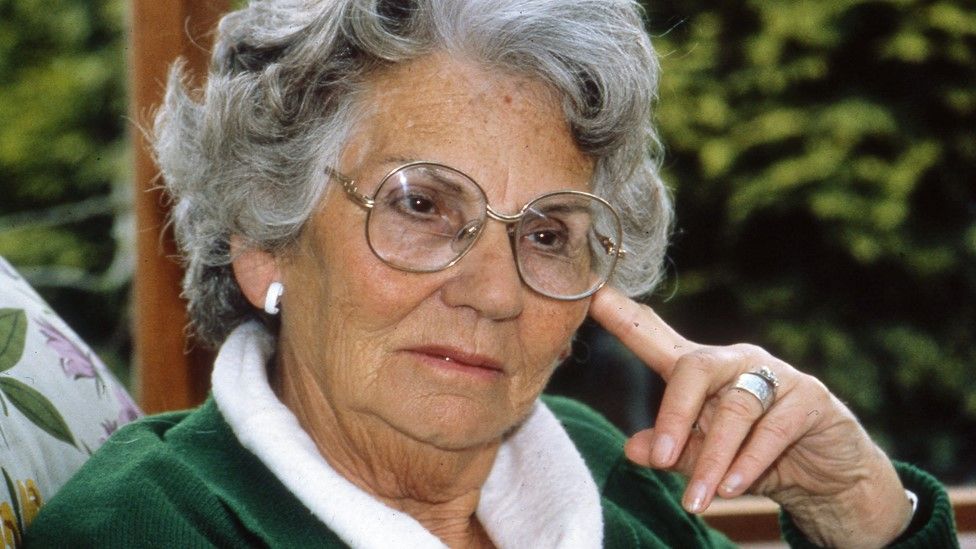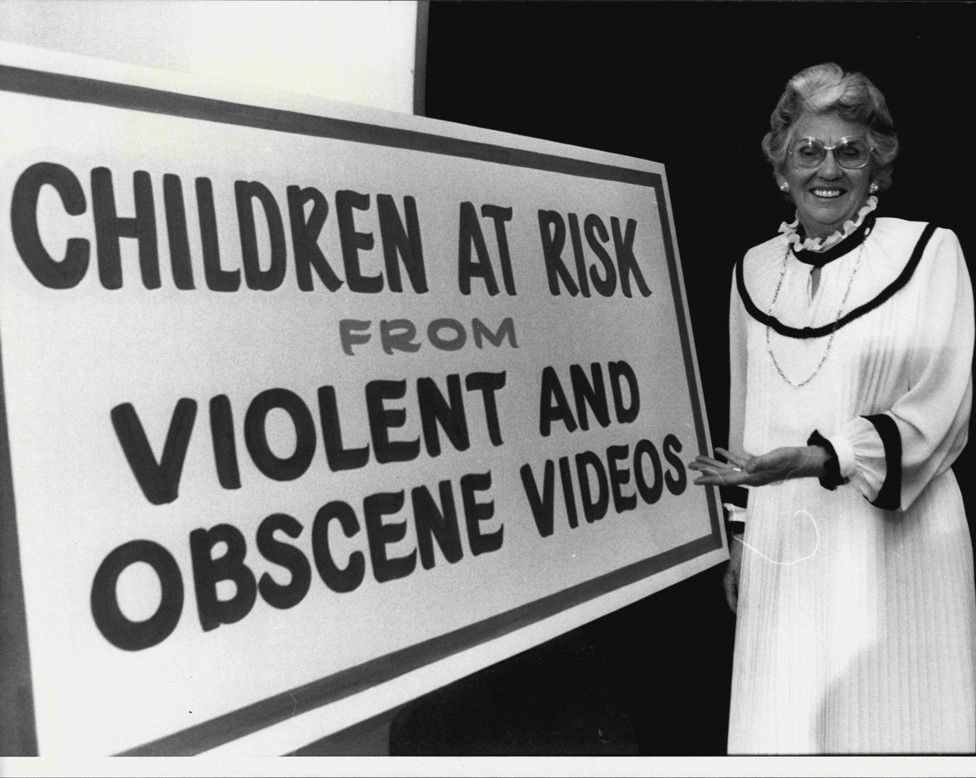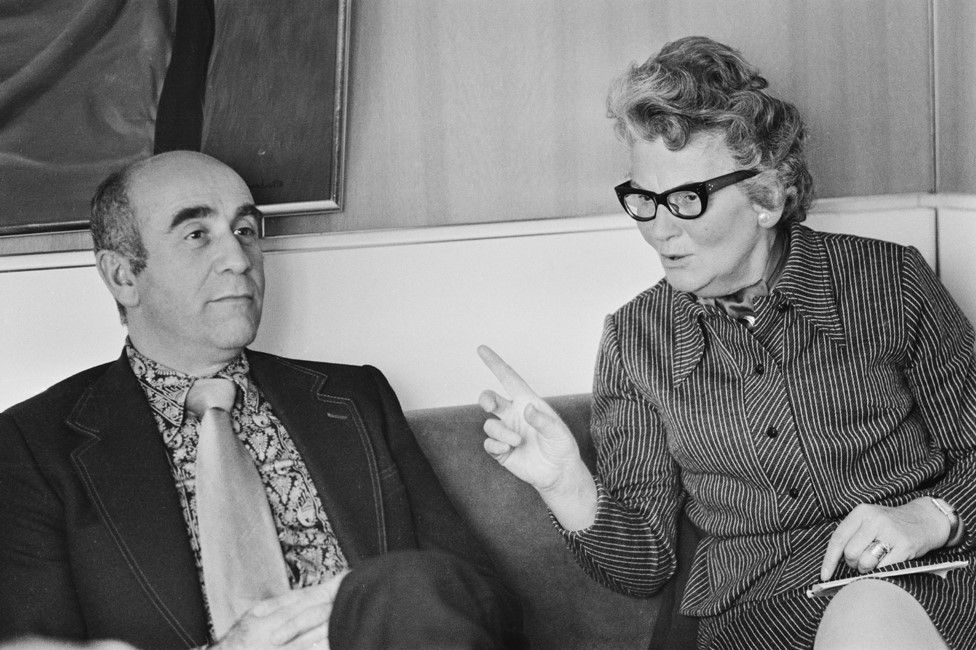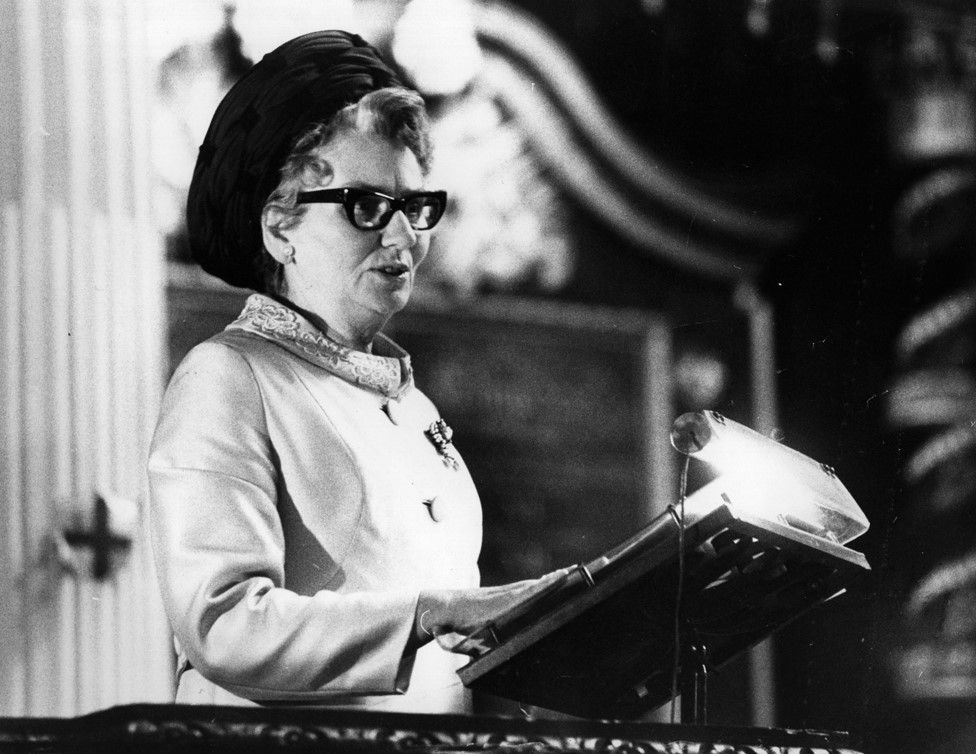Was moral campaigner Mary Whitehouse ahead of her time?
The Christian decency campaigner Mary Whitehouse's name became shorthand for anti-liberal prudery and censorship, but more than 20 years after her death, do her diaries reveal a woman who was ahead of her time in warning about the corrosive impact of internet pornography on society, asks Samira Ahmed.
Few people under 40 will remember her at all. However 30 years of Mary Whitehouse's diaries and letters in the Bodleian library reveal interesting lessons for modern Britain.
Mary's biggest campaign was against obscenity - mainly pornography. Her eldest son Paul, who inherited her diaries, says of the ongoing political debate about online harms, "I hear the stone rumbling in my mother's grave as she turns over".
Mary persistently lobbied MPs and ministers to draft legislation. Her successes include the 1978 Protection of Children Act, which criminalised for the first time the making of indecent images of children, the 1981 Indecent Displays (Control) Act which controlled sex shops and the displays of pornographic material in newsagents, and the 1984 Video Recordings Act, to regulate the explosion in the sale of extreme content (so-called "video nasties") in the new Wild West of home VCRs.
Mary Whitehouse was firmly allied with the right wing of the Conservative Party, but pornography brought out the Marxist in her as she astutely diagnosed that big business and exploitation (she used the term "sexploitation"), not freedom of expression, was driving the industry. She often said, "Pornography is the dirty face of capitalism".
In 1974 she wrote: "The young today are more pressurised and exploited than ever before. I'm fighting for their right not to be exploited."
Mary also warned against technology becoming out of control, while addressing a computer industry technology conference in Rome in November 1975.
"May I first share my fear that technology is overstepping itself," she said in her speech. "It does seem, to the lay mind, that the power of computer technology can reach a point where man is incapable of arresting the forces which he has released."
She could have been talking about the impact of porn on school-age children today. An Ofsted report in June 2021 found 80% of girls were pressured to provide sexual images, and nominally adults-only platforms such as Pornhub and OnlyFans have been accused by campaigners and MPs of consistently failing to deal with abusive and exploitative material including under age content, upskirting, revenge porn and other non-consensual imagery.
Whitehouse's personal bond with Margaret Thatcher is well known, but Mrs Thatcher's successor, John Major also engaged with Whitehouse's campaign to prevent online harm, as digital technology developed rapidly through the 1990s. He recognised a kindred spirit.
"Mary was… an outsider taking on a powerful establishment with courage - and I admired that," he says. "Pornography and the exploitation of children was dangerous and growing, and Mrs Whitehouse was their undoubted foe. Upon these issues I supported her completely."
Whitehouse's work reminds us there is no substitute for the hard graft of getting legislation through parliament. Tightening up the obscenity laws was the unfulfilled goal of her life.
Her attempts through private members bills to bring in a "laundry list" of proscribed acts was much mocked, but the successful cross-party alliance that saw non-fatal strangulation finally made a criminal offence in the 2021 Domestic Abuse Act, seems a carefully targeted application of Whitehouse's thinking - that there are acts which can be identified as of concern. The ubiquity of choking women in porn is recognised as just such an issue. The act also specifically blocks the use of a "rough sex gone wrong" defence.
Whitehouse's motivation was always about making institutions more accountable to ordinary citizens and challenging their biases. Ofcom has its origins in the Broadcasting Standards Council set up in 1988 - the outcome of her decades long push for ordinary citizens to have an ongoing role in the monitoring of broadcasting standards.
In November 1974, she wrote to the attorney general suggesting the law be amended to ensure that juries were 50% female.
"Anything else is certainly out of sympathy with the sex equality law which is just coming in," she pointed out, a clever reference to the new Sex Discrimination Act.
The idea came after police told her it was now the "general strategy" for the defence in obscenity cases to object to prospective women jurors.
"Women are used in pornography and women often suffer greatly at the hands of men who are addicted to it, and they should be able to play their part in controlling it through the process of law," she said. "If the defendant objects to a particular woman juror, she should be replaced by another woman, and not by a man."
A current issue Whitehouse would recognise is no-platforming at universities - the idea of denying controversial speakers the chance to speak at an institution. Her diaries reveal an exhausting schedule as she spent much of the year on the road, addressing student unions and debating with prominent names from the adult entertainment industry. One was Victor Lownes, who ran Playboy Clubs in Europe. She often shaped the wording of the motions on pornography and indecency to frame the debate in a more nuanced way than censorship versus free speech.
She braved death threats, verbal abuse, actual assaults and, in one case, students lowering an effigy of her on a rope as she spoke, often showing a remarkable sense of humour.
Whitehouse's diaries are packed with accounts of late night chats after the debates, and most touchingly thank you notes from students. Some wrote to her years later to apologise for their aggression. Some still disagreed with her, but others admitted she had changed their views.
Feminist academic and writer Julie Bindel was a young lesbian activist when she went to see Mary Whitehouse speak at Leeds University around 1980, and challenged her. Bindel vehemently disagreed with her sweeping views on obscenity and homosexuality (Mary's evangelical Christian beliefs meant she thought homosexuality was a sin), but was impressed by her ability to manage the hostile crowd.
"She was a brilliant speaker, formidable," she says. "I remember sitting there, thinking, 'God how does she do that?' You know, her timing, her pace, her engaging the audience."
Mary died in 2001 at the age of 91. Although some of her religious beliefs were very out of step with modern Britain, she would see the impact of internet pornography on the young as exactly what she'd been warning against, and support the current efforts to finally get it under control.




No comments:
Post a Comment